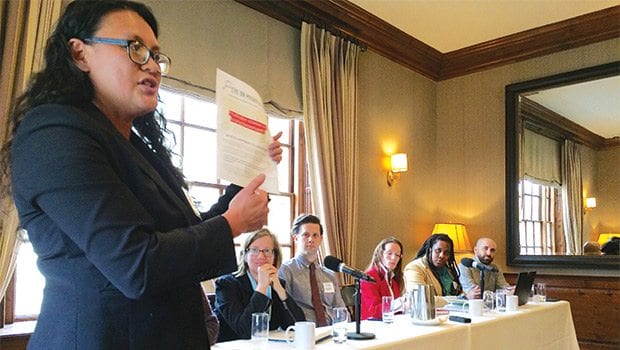
From the MBTA’s recent outsourcing of its cash-counting operations to the heavily-funded campaign to lift the cap on charter schools, Massachusetts is witness to a push for greater privatization of services that traditionally have been public, or government-provided.

Author: Sandra LarsonNAACP Boston Branch Executive Director Nia Evans makes a point.
Privatization advocates tout cost-saving efficiencies and higher performance of privately-run services, but experts on a recent panel discussion about privatization in Massachusetts said that evidence for such positive outcomes is lacking and that relinquishing public accountability for essential services is cause for alarm.
The Nov. 22 panel was convened by Community Labor United, a Boston-based coalition of community and labor groups. Speakers from local and national nonprofits and institutions sought to debunk common notions about the benefits of privatizing and aired concerns about potential negative impacts.
“There’s a strange conventional wisdom that the market can do things cheaper and more efficiently than government,” said Jeremy Mohler, a communications specialist with In the Public Interest, a Washington, D.C.-based nonprofit that tracks the impact of privatization nationally. “[But] it’s just wrong. The evidence is mixed at best that it’s cheaper, and it’s certainly not better in a lot of cases. On top of that we end up giving away important control to private actors.”
He cited some examples of failed efforts, such as Iowa’s privatization of Medicaid earlier this year. Within just a few months, health care providers were not being paid on time and the program was in crisis, jeopardizing the health of nearly 600,000 vulnerable Iowa residents. In another example, a private bus company in Washington, D.C. pays drivers low wages, yet its strict cost-cutting mode has failed to ensure safe brakes and emergency windows.
“Privatization is when the market replaces democracy in determining how and to whom public goods and services are provided,” Mohler said. “So this issue really gets to the heart of what we value in our society and what we feel the role of government is.”
Dubious benefits
Neenah Estrella-Luna, a Northeastern University public policy professor and a public health and environment activist, said that rigorous research in and outside of the U.S. over decades dispels the “myth” of privatization’s cost savings and service improvement. She noted that with services like public transit, it’s not even realistic to expect those benefits.
“Privatization can only reduce costs to government by limiting access to the service, lowering the quality of service or impoverishing the workers,” Estrella-Luna said.
Last week’s event coincided with the release of a report, “Privatizing Massachusetts: The Right Wing’s Blue State Game Plan,” by Political Research Associates (PRA), a Somerville organization that tracks the conservative right wing in the U.S.
The new report describes how the Pioneer Institute, a Boston-based research and policy think tank influential in Massachusetts policy, displays a nonpartisan face while furthering a right-leaning agenda that favors limited government and free market principles.
“Pioneer wants the government to operate by market principles,” said PRA Research Fellow Abby Scher, author of the new report. “The goal of the market is efficiency. This produces a kind of moral blindness. If the only thing we’re going for is economic efficiency, we can’t pursue other things, such as the living standards of the people doing the work.”
Scher noted that Massachusetts Governor Charlie Baker and James Peyser, the state’s education secretary, both are former executive directors of the Pioneer Institute. Also of concern, President-elect Donald Trump shows clear signs of favoring privatization in infrastructure projects and education.
On the web
“Privatizing Massachusetts” report: http://bit.ly/2fDL7Cq
Community Labor United: massclu.org
CLU public information project: EyeOnPrivatization.org
In the Public Interest: Inthepublicinterest.org
Pioneer Institute: http://pioneerinstitute.org
Education
Scher said that charter schools are an excellent example of how privatization removes public control.
“Charter networks displace public school boards in getting public funds to provide education. Charter networks are private. They are not accountable to the voters,” she said. “It’s a new governing rationality, and people don’t know that it’s going on.”
While Massachusetts voters in November roundly rejected ballot Question 2, which would have allowed more charter schools in Boston and other cities, the anti-privatization victory came despite a whopping $24.2 billion spent in support of the measure by local and out-of-state interests that included members of the Walton family that owns Walmart and financial industry players as well as “dark money” whose donors are not disclosed.
At last week’s discussion, NAACP Boston Executive Director Nia Evans noted that her organization has opposed privatization of education for decades.
“We are concerned with differing standards for transparency and accountability between charter and traditional public schools,” Evans said, “and about diverting public funds.”
The discussion was moderated by Elena Letona, executive director of Neighbor to Neighbor, a grassroots group working to combat income inequality, environmental degradation and racism in Massachusetts. Other speakers and panelists were Darlene Lombos, executive director of Community Labor United; Steven Tolman, president of Massachusetts AFL-CIO; and Chris Faraone, founder of the Boston Institute for Nonprofit Journalism.






